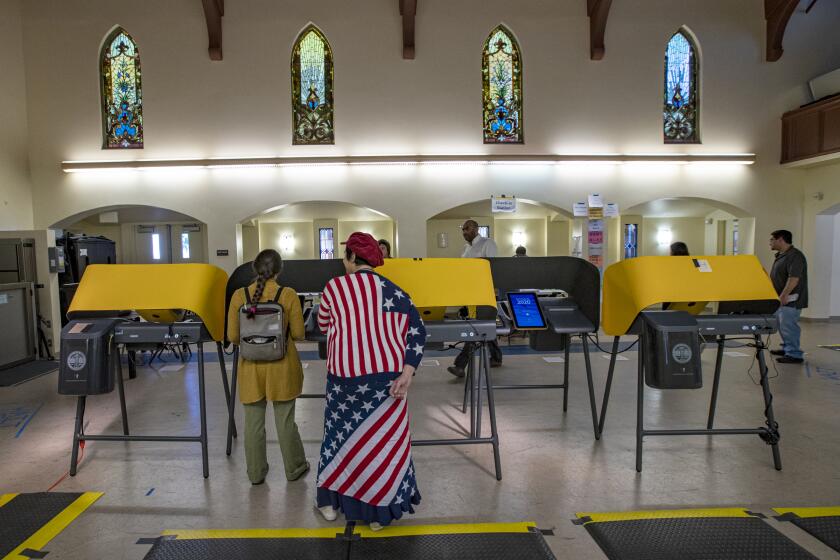Editorial: Kevin de León’s campaign finance shell game gives career politicians a bad name

- Share via
Councilmember Kevin de León is facing a tough reelection campaign because of his role in the racist leaked audio scandal two years ago. To help make his case, the veteran Sacramento politician is tapping his state campaign war chest to pay for self-promoting ads advocating for three ballot measures.
De León, who came in second in the March primary after tenant rights attorney Ysabel Jurado, is uniquely able to bombard Council District 14 voters with his mug because he has $3 million in a campaign account he created several years ago for a possible run for lieutenant governor.
In California’s Democratic-controlled Legislature, more than a dozen environmental bills recently died amid heavy industry opposition.
De León is prohibited from transferring money from his state committee into his city reelection campaign committee, Times reporters Dakota Smith and David Zahniser explained. But he can roll that money into other committees focused on political causes — which he did.
The council incumbent is following a familiar playbook. Many politicians, including Gov. Gavin Newsom, former Gov. Arnold Schwarzenegger and former L.A. Mayor Antonio Villaraigosa, have used spending on ballot measure campaigns to boost their profiles.
So far, he’s transferred $600,000 to the Kevin de León Believing in a Better California Ballot Measure Committee, which will promote Proposition 3 to affirm marriage equality, Proposition 32 to set an $18 minimum wage and Proposition 33 to expand rent control.
Already the ballot measure committee has paid for a glossy “Yes on Prop 32” campaign door hanger adorned with his picture that proclaims “then-Senate President Kevin de León wrote the bill to raise California’s minimum wage. Now he’s fighting to raise it again.”
My son had been a poll worker before his sudden death. In my grief, I followed his example and found a nonpartisan way to bridge our country’s political divide.
Because this is a state ballot measure committee, rather than a city committee, De León has fewer constraints on how he uses the money and doesn’t have to report his spending to the city’s Ethics Commission, Politico reported. As long as the ballot measure ads don’t expressly tell people to vote for him, this is allowed under California law.
But just because it’s legal doesn’t mean it’s right.
This kind of campaign fund shell game sours the public on career politicians. As we’ve said, there’s nothing wrong with people who make a career out of public service, and on-the-job experience is usually an asset. Of course elected officials regularly use their surplus campaign cash to help get others elected and support ballot measures they believe in, but using it to pay for a barely disguised campaign ad is unsavory and counter to the intent, if not the letter of the law.
If you wouldn’t want an inexperienced surgeon cutting you open, why would you want a rookie running your government? Politics is backwards because being an experienced elected official in an election year is often a liability.
While in Sacramento De León was able to use his position as Senate president pro tem to raise gobs of money from interest groups. When he was termed out, he rolled the leftover campaign cash into a placeholder lieutenant governor campaign account. And now he can use that money as a backdoor way to boost his city reelection campaign, in addition to the city-regulated fundraising and campaigning he is doing.
California Common Cause, which pushes for transparency in political spending, would like to see more restrictions on how candidate-controlled ballot measure committees spend their money, such as ensuring a larger percentage of the ad is promoting the issue rather than the candidate. Or the state could require that candidates get donor permission before transferring money to a ballot measure campaign committee.
Those are worthy ideas that state lawmakers and the Fair Political Practices Commission should explore. Candidates are going to look for any edge in a competitive race; the state has a responsibility to make the playing field as level as possible.
More to Read
A cure for the common opinion
Get thought-provoking perspectives with our weekly newsletter.
You may occasionally receive promotional content from the Los Angeles Times.













